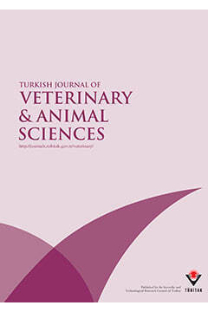Estimation of Breeding Values for Dairy Cattle Using Test-Day Milk Yields
The objectives of this study were to estimate genetic parameters and breeding values for test-day (TD) and 305-day milk yields, and to compare the results from TD and 305-day analyses. The data comprised 10,822 TD records from 1103 first lactations of Holstein cows from state farms in the western part of Turkey. Additive genetic, residual and permanent environmental variances, heritabilities and breeding values for 305-day and TD milk yields were estimated by the REML method using animal models. The heritability estimate (0.11) of TD milk yields was lower than the corresponding estimate (0.25) for 305-day milk yields. The product-moment correlations (? 0.97) show that estimated breeding values (EBVs) for TD milk yields are closely correlated with EBVs for 305-day milk yields. Spearman and Kendall rank correlations between rankings of animals for EBVs for TD and 305-day milk yields were also high (? 0.97 and ? 0.86, respectively). Shifts in rank for various top lists of cows and sires ranked by their EBVs for 305-day and TD milk yields show that more extreme changes in ranks occurred in cows than in sires. TD milk yields could be used instead of 305-day milk yield for the genetic evaluation of dairy cattle. Furthermore, using TD yields for genetic evaluations offers more advantages.
Estimation of Breeding Values for Dairy Cattle Using Test-Day Milk Yields
The objectives of this study were to estimate genetic parameters and breeding values for test-day (TD) and 305-day milk yields, and to compare the results from TD and 305-day analyses. The data comprised 10,822 TD records from 1103 first lactations of Holstein cows from state farms in the western part of Turkey. Additive genetic, residual and permanent environmental variances, heritabilities and breeding values for 305-day and TD milk yields were estimated by the REML method using animal models. The heritability estimate (0.11) of TD milk yields was lower than the corresponding estimate (0.25) for 305-day milk yields. The product-moment correlations (? 0.97) show that estimated breeding values (EBVs) for TD milk yields are closely correlated with EBVs for 305-day milk yields. Spearman and Kendall rank correlations between rankings of animals for EBVs for TD and 305-day milk yields were also high (? 0.97 and ? 0.86, respectively). Shifts in rank for various top lists of cows and sires ranked by their EBVs for 305-day and TD milk yields show that more extreme changes in ranks occurred in cows than in sires. TD milk yields could be used instead of 305-day milk yield for the genetic evaluation of dairy cattle. Furthermore, using TD yields for genetic evaluations offers more advantages.
